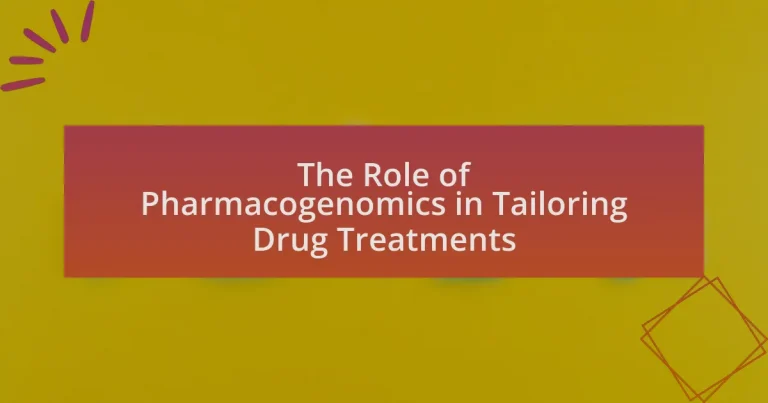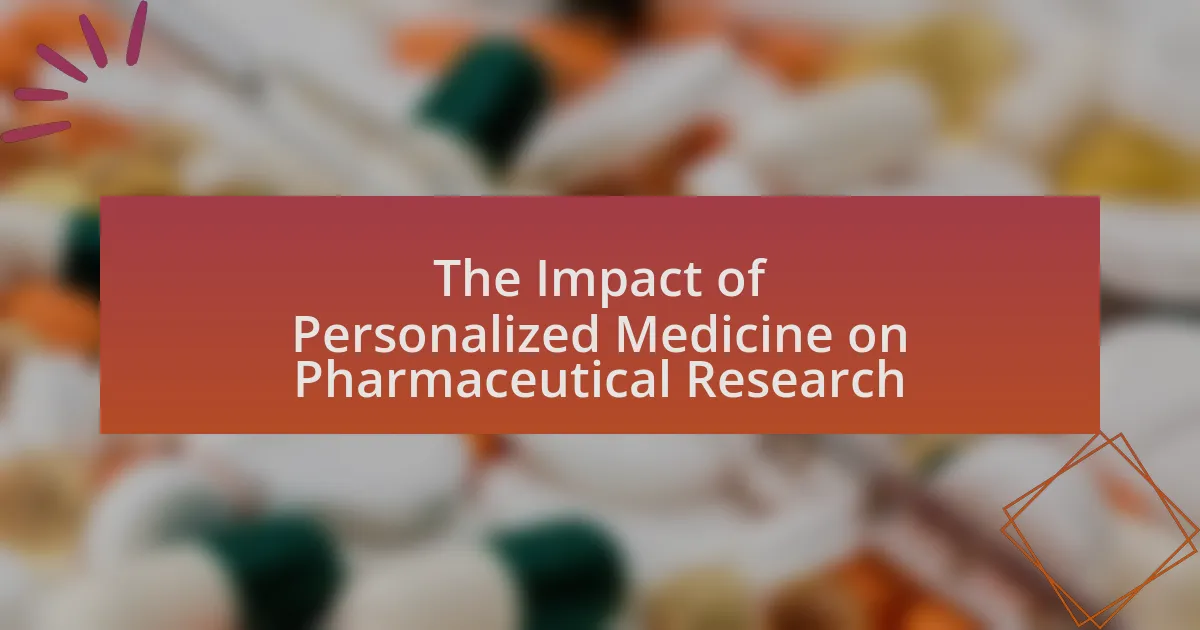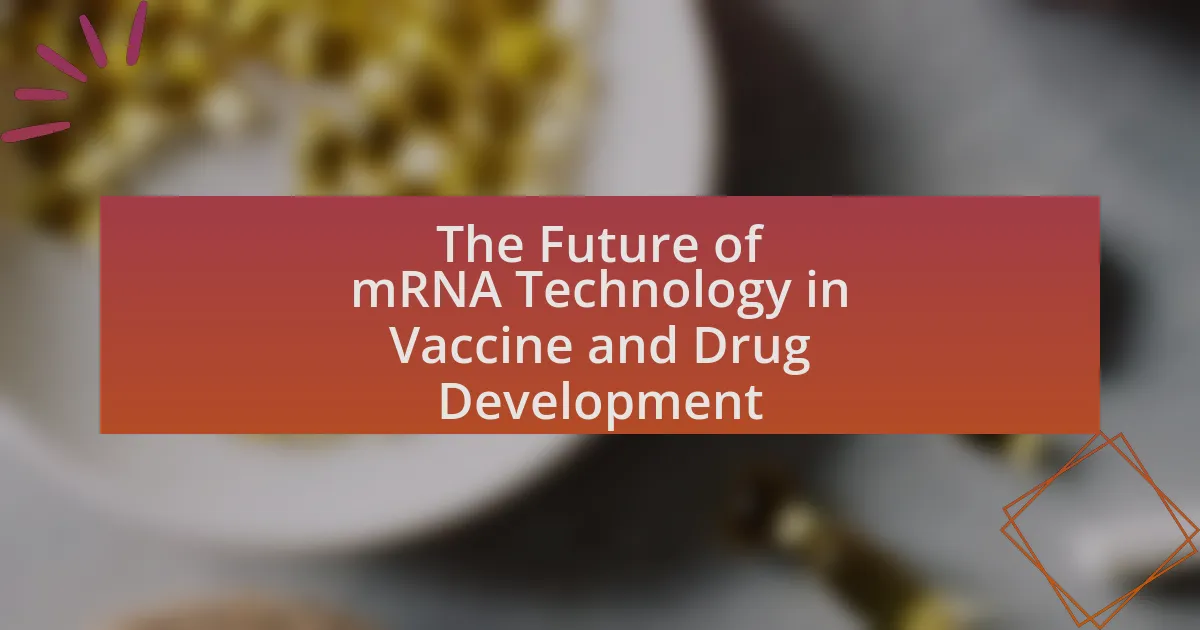Pharmacogenomics is a field that examines how an individual’s genetic makeup influences their response to medications, playing a vital role in personalizing drug treatments. This article explores the impact of genetic variations on drug efficacy and safety, highlighting key genetic factors such as single nucleotide polymorphisms and gene expression levels. It discusses the importance of pharmacogenomics in personalized medicine, the benefits of tailored drug treatments, and the technologies used in pharmacogenomic testing. Additionally, the article addresses the challenges clinicians face in implementing pharmacogenomic data, ethical considerations surrounding patient privacy and consent, and practical tips for enhancing the use of pharmacogenomics in clinical practice.
What is the Role of Pharmacogenomics in Tailoring Drug Treatments?
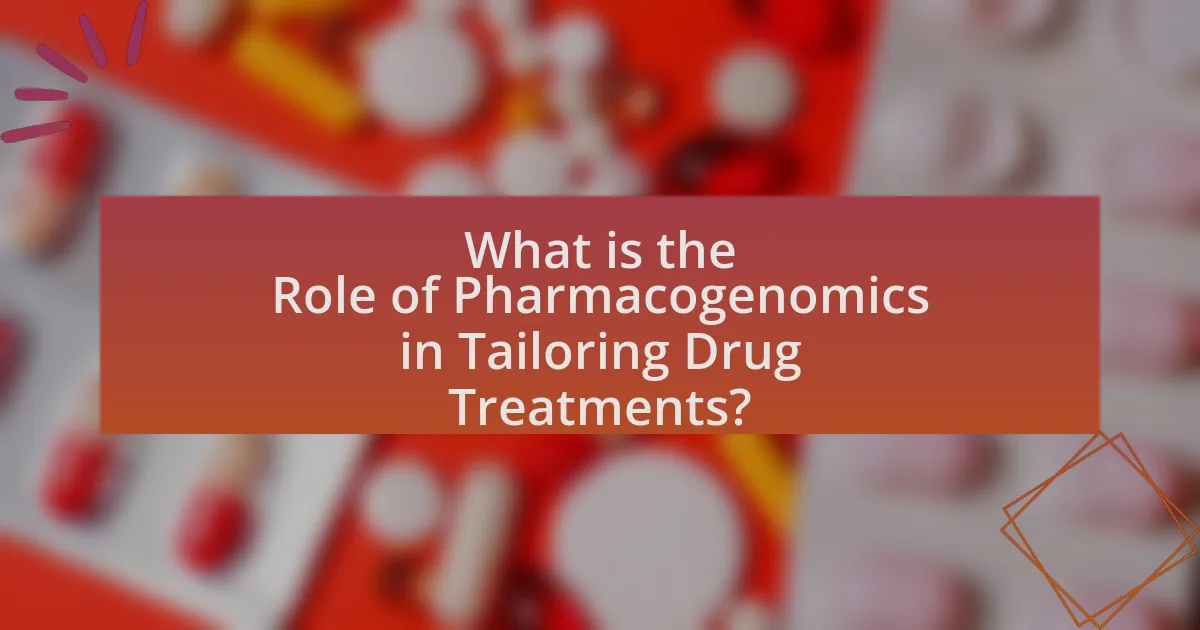
Pharmacogenomics plays a crucial role in tailoring drug treatments by analyzing how an individual’s genetic makeup affects their response to medications. This field enables healthcare providers to predict which drugs will be most effective and safe for a patient based on their genetic profile, thereby minimizing adverse drug reactions and enhancing therapeutic outcomes. For instance, studies have shown that variations in genes such as CYP2D6 can significantly influence the metabolism of certain drugs, leading to differences in efficacy and safety among patients. By integrating pharmacogenomic data into clinical practice, personalized medicine can be achieved, optimizing treatment strategies for various conditions.
How does pharmacogenomics influence drug efficacy and safety?
Pharmacogenomics influences drug efficacy and safety by tailoring medication choices based on an individual’s genetic makeup. This field studies how genetic variations affect drug metabolism, efficacy, and the risk of adverse effects. For instance, specific genetic polymorphisms in enzymes like CYP450 can lead to differences in drug metabolism rates, impacting how well a drug works and the likelihood of side effects. Research has shown that patients with certain genetic profiles may require different dosages or alternative medications to achieve optimal therapeutic outcomes, thereby enhancing drug efficacy and minimizing safety risks.
What genetic factors are considered in pharmacogenomics?
Pharmacogenomics considers several genetic factors, primarily single nucleotide polymorphisms (SNPs), gene copy number variations, and gene expression levels. SNPs can influence drug metabolism, efficacy, and toxicity by altering the function of drug-metabolizing enzymes, transporters, and drug targets. For instance, variations in the CYP2D6 gene affect the metabolism of approximately 25% of commonly prescribed medications, leading to differences in drug response among individuals. Gene copy number variations can also impact the expression of drug-metabolizing enzymes, while gene expression levels can determine the sensitivity of a patient to specific therapies. These genetic factors are crucial for personalizing drug treatments to enhance efficacy and minimize adverse effects.
How do these genetic factors impact individual responses to medications?
Genetic factors significantly impact individual responses to medications by influencing drug metabolism, efficacy, and the likelihood of adverse effects. Variations in genes, such as those encoding drug-metabolizing enzymes like CYP450, can lead to differences in how individuals process medications. For instance, individuals with certain polymorphisms in the CYP2D6 gene may metabolize drugs like antidepressants and opioids either too quickly or too slowly, affecting therapeutic outcomes and side effects. Studies have shown that pharmacogenomic testing can predict these variations, allowing for personalized medication regimens that enhance efficacy and minimize risks, thereby improving overall treatment success.
Why is pharmacogenomics important in personalized medicine?
Pharmacogenomics is important in personalized medicine because it enables the customization of drug therapies based on an individual’s genetic makeup. This approach enhances the efficacy and safety of treatments by identifying how genetic variations affect drug metabolism, efficacy, and the risk of adverse effects. For instance, studies have shown that patients with specific genetic variants may respond better to certain medications, such as warfarin, where genetic testing can guide appropriate dosing to minimize bleeding risks. By integrating pharmacogenomic data into clinical practice, healthcare providers can make informed decisions that lead to improved patient outcomes and reduced trial-and-error prescribing.
What are the potential benefits of personalized drug treatments?
Personalized drug treatments offer significant benefits, including improved efficacy, reduced adverse effects, and enhanced patient adherence. By tailoring medications to an individual’s genetic makeup, healthcare providers can select drugs that are more likely to be effective for specific patients, as evidenced by studies showing that pharmacogenomic-guided therapies can lead to better clinical outcomes. For instance, research published in the Journal of the American Medical Association indicates that patients receiving personalized treatments based on genetic testing experienced a 30% increase in treatment success rates compared to those on standard therapies. Additionally, personalized approaches can minimize the risk of side effects, as medications can be chosen to avoid known adverse reactions linked to a patient’s genetic profile, thereby improving overall safety and patient satisfaction.
How does pharmacogenomics reduce adverse drug reactions?
Pharmacogenomics reduces adverse drug reactions by tailoring drug treatments based on individual genetic profiles. This personalized approach allows healthcare providers to predict how a patient will respond to specific medications, thereby minimizing the risk of harmful side effects. For instance, genetic variations in drug-metabolizing enzymes can significantly affect drug efficacy and safety; studies have shown that patients with certain genetic markers are at a higher risk for adverse reactions to drugs like warfarin and clopidogrel. By utilizing pharmacogenomic testing, clinicians can select the most appropriate medication and dosage for each patient, leading to improved therapeutic outcomes and reduced incidence of adverse drug reactions.
What are the key components of pharmacogenomics?
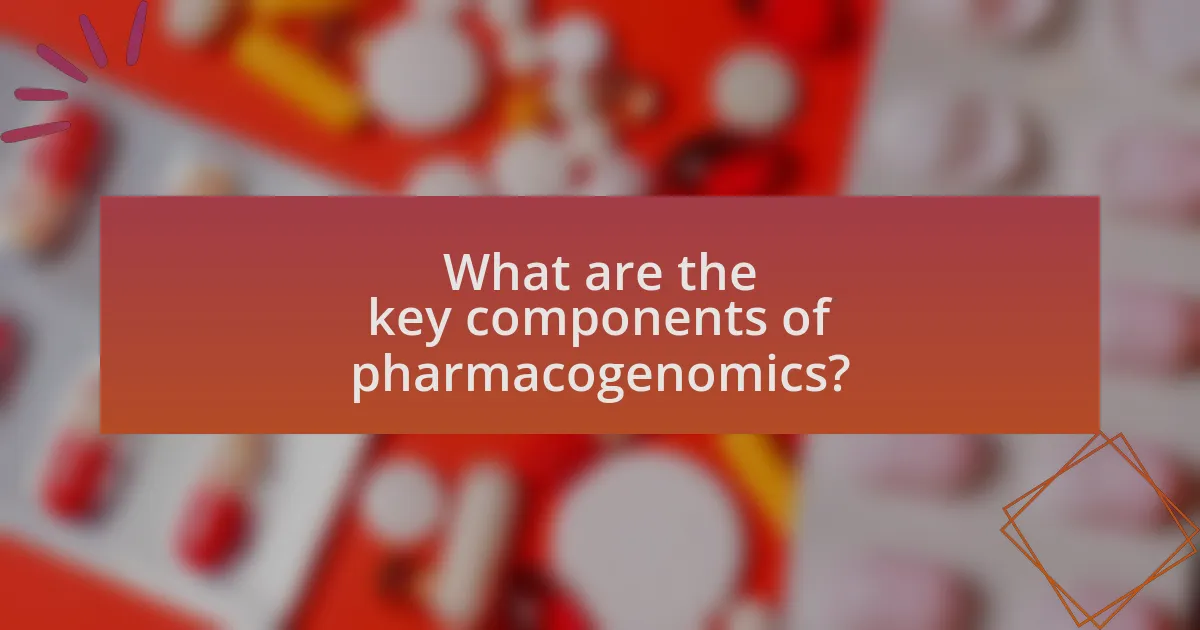
The key components of pharmacogenomics include genetic variation, drug metabolism, and therapeutic efficacy. Genetic variation refers to differences in DNA sequences among individuals that can influence how drugs are processed in the body. Drug metabolism involves the biochemical modification of pharmaceutical compounds, which can be affected by genetic factors, leading to variations in drug response. Therapeutic efficacy is the effectiveness of a drug in achieving its intended therapeutic outcome, which can be optimized through understanding an individual’s genetic makeup. These components are essential for personalizing drug treatments to improve patient outcomes and minimize adverse effects.
What technologies are used in pharmacogenomic testing?
Pharmacogenomic testing utilizes several key technologies, including next-generation sequencing (NGS), polymerase chain reaction (PCR), and microarray analysis. Next-generation sequencing allows for the comprehensive analysis of multiple genes simultaneously, providing detailed insights into genetic variations that affect drug metabolism. Polymerase chain reaction is employed to amplify specific DNA sequences, enabling the detection of known genetic variants associated with drug response. Microarray analysis facilitates the simultaneous examination of thousands of genetic variants, allowing for a broad assessment of pharmacogenomic markers. These technologies collectively enhance the ability to tailor drug treatments based on individual genetic profiles, improving therapeutic outcomes.
How do genomic sequencing and genotyping differ?
Genomic sequencing and genotyping differ primarily in their scope and purpose. Genomic sequencing involves determining the complete DNA sequence of an organism’s genome, providing comprehensive information about all genetic variations, including single nucleotide polymorphisms (SNPs), insertions, deletions, and structural variations. In contrast, genotyping focuses specifically on identifying the presence or absence of particular genetic variants, often targeting specific SNPs or loci of interest.
For example, genomic sequencing can reveal the entire genetic makeup of an individual, which is crucial for understanding complex traits and diseases, while genotyping is typically used in studies that require information on specific genetic markers, such as in pharmacogenomics to predict drug response based on known variants. This distinction is significant in the context of tailoring drug treatments, as genomic sequencing can provide a broader understanding of genetic factors influencing drug metabolism and efficacy, whereas genotyping can quickly assess known variants relevant to specific medications.
What role do bioinformatics play in pharmacogenomics?
Bioinformatics plays a crucial role in pharmacogenomics by enabling the analysis of genetic data to understand how individual genetic variations affect drug response. This field utilizes computational tools and algorithms to process large datasets, such as genomic sequences, which helps identify biomarkers associated with drug efficacy and toxicity. For instance, bioinformatics facilitates the integration of genomic information with clinical data, allowing for personalized medicine approaches that optimize drug selection and dosing based on a patient’s genetic profile. This integration is supported by studies showing that pharmacogenomic-guided therapies can improve treatment outcomes and reduce adverse drug reactions, demonstrating the significant impact of bioinformatics in advancing personalized healthcare.
What types of drugs are most affected by pharmacogenomics?
Drugs most affected by pharmacogenomics include those used in oncology, psychiatry, and cardiology. Specifically, medications such as warfarin, clopidogrel, and various antidepressants are significantly influenced by genetic variations. For instance, the effectiveness of warfarin can vary based on genetic polymorphisms in the CYP2C9 and VKORC1 genes, which can lead to adverse effects or treatment failure if not properly managed. Similarly, clopidogrel’s efficacy is impacted by variations in the CYP2C19 gene, affecting platelet aggregation and increasing the risk of cardiovascular events. These examples illustrate how pharmacogenomics plays a crucial role in optimizing drug therapy based on individual genetic profiles.
Which therapeutic areas benefit the most from pharmacogenomic insights?
Oncology, psychiatry, and cardiology are the therapeutic areas that benefit the most from pharmacogenomic insights. In oncology, pharmacogenomics helps tailor cancer treatments based on genetic mutations, improving efficacy and reducing adverse effects. In psychiatry, it aids in selecting appropriate antidepressants and antipsychotics by considering genetic variations that affect drug metabolism. In cardiology, pharmacogenomic testing informs the use of anticoagulants and statins, optimizing treatment based on individual genetic profiles. These applications demonstrate the significant impact of pharmacogenomics in enhancing treatment outcomes across these critical therapeutic areas.
How do specific drug classes utilize pharmacogenomic data?
Specific drug classes utilize pharmacogenomic data to optimize therapeutic efficacy and minimize adverse drug reactions. For instance, in oncology, drugs like trastuzumab are prescribed based on HER2 gene amplification status, ensuring that only patients with the appropriate genetic profile receive the treatment, which significantly improves outcomes. Similarly, in psychiatry, medications such as selective serotonin reuptake inhibitors (SSRIs) are adjusted according to genetic variations in the CYP450 enzyme system, which affects drug metabolism. This targeted approach is supported by studies indicating that pharmacogenomic-guided therapy can lead to better patient adherence and reduced healthcare costs, as evidenced by research published in the Journal of Personalized Medicine, which highlights the effectiveness of pharmacogenomics in improving treatment responses across various drug classes.
How is pharmacogenomics implemented in clinical practice?
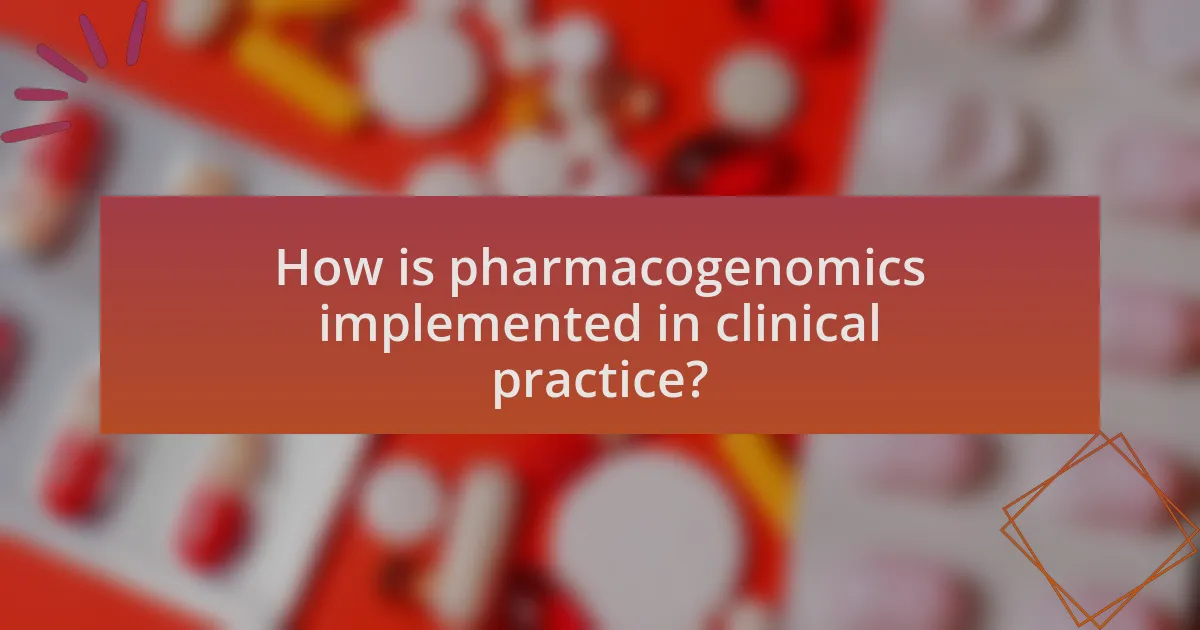
Pharmacogenomics is implemented in clinical practice through genetic testing that informs medication selection and dosing based on individual genetic profiles. This approach allows healthcare providers to predict patient responses to specific drugs, thereby enhancing efficacy and minimizing adverse effects. For instance, the Clinical Pharmacogenetics Implementation Consortium (CPIC) provides guidelines that help clinicians interpret pharmacogenomic test results and apply them in prescribing decisions. Studies have shown that utilizing pharmacogenomic data can lead to improved treatment outcomes, such as reduced hospitalizations and better management of chronic diseases.
What steps are involved in integrating pharmacogenomics into treatment plans?
Integrating pharmacogenomics into treatment plans involves several key steps: assessing patient genetic information, selecting appropriate medications based on genetic profiles, monitoring treatment outcomes, and adjusting therapies as needed. The first step requires healthcare providers to obtain genetic testing results that identify variations affecting drug metabolism. Following this, clinicians can choose medications that align with the patient’s genetic makeup, enhancing efficacy and minimizing adverse effects. Continuous monitoring of the patient’s response to the treatment is essential to ensure optimal outcomes. Finally, adjustments to the treatment plan may be necessary based on the patient’s evolving genetic information or response to therapy, ensuring a personalized approach to medication management.
How do healthcare providers interpret pharmacogenomic test results?
Healthcare providers interpret pharmacogenomic test results by analyzing genetic variations that affect an individual’s response to medications. They utilize these results to guide drug selection and dosing, ensuring that treatments are tailored to the patient’s genetic profile. For instance, specific gene variants can indicate whether a patient is likely to metabolize a drug quickly or slowly, which can significantly impact efficacy and safety. Studies have shown that incorporating pharmacogenomic data into clinical practice can lead to improved patient outcomes, reduced adverse drug reactions, and optimized therapeutic efficacy.
What challenges do clinicians face when applying pharmacogenomic data?
Clinicians face several challenges when applying pharmacogenomic data, including the complexity of genetic information, variability in patient responses, and the integration of pharmacogenomic testing into clinical practice. The complexity arises from the need to interpret vast amounts of genetic data, which can be influenced by multiple genes and environmental factors. Variability in patient responses complicates the application of pharmacogenomic data, as not all patients with the same genetic profile will respond identically to a drug. Furthermore, integrating pharmacogenomic testing into clinical workflows requires changes in practice patterns, education for healthcare providers, and the establishment of guidelines, which can be resource-intensive and time-consuming. These challenges hinder the widespread adoption of pharmacogenomics in personalized medicine.
What are the ethical considerations surrounding pharmacogenomics?
The ethical considerations surrounding pharmacogenomics include issues of consent, privacy, and potential discrimination. Informed consent is crucial, as patients must understand how their genetic information will be used in treatment decisions. Privacy concerns arise from the sensitive nature of genetic data, which could be misused if not adequately protected. Additionally, there is a risk of discrimination by employers or insurers based on genetic predispositions, which raises questions about equity and access to healthcare. These considerations are supported by guidelines from organizations such as the American Medical Association, which emphasize the importance of ethical practices in genetic testing and its implications for patient care.
How does pharmacogenomics impact patient privacy and consent?
Pharmacogenomics significantly impacts patient privacy and consent by necessitating the collection and analysis of genetic information, which raises concerns about data security and potential misuse. The sensitive nature of genetic data means that unauthorized access could lead to discrimination in healthcare or employment. Furthermore, informed consent becomes crucial, as patients must understand how their genetic information will be used, shared, and protected. Studies indicate that patients are often unaware of the implications of pharmacogenomic testing, highlighting the need for clear communication and robust consent processes to ensure that individuals are fully informed about their rights and the potential risks associated with sharing their genetic data.
What are the implications of genetic discrimination in pharmacogenomics?
Genetic discrimination in pharmacogenomics can lead to unequal access to personalized medicine and exacerbate health disparities. When individuals are judged based on their genetic information, it may result in insurers denying coverage or employers making hiring decisions influenced by genetic predispositions to certain drug responses. For instance, a study published in the American Journal of Human Genetics highlights that individuals with certain genetic markers may face higher insurance premiums or be excluded from clinical trials, limiting their treatment options. This discrimination undermines the potential benefits of pharmacogenomics, which aims to optimize drug therapies based on individual genetic profiles, ultimately hindering advancements in equitable healthcare.
What practical tips can enhance the use of pharmacogenomics in drug treatments?
To enhance the use of pharmacogenomics in drug treatments, healthcare providers should integrate genetic testing into routine clinical practice. This integration allows for personalized medication selection based on an individual’s genetic profile, which can improve drug efficacy and reduce adverse effects. For instance, studies have shown that patients with specific genetic variants may metabolize drugs differently, necessitating dosage adjustments to achieve optimal therapeutic outcomes. Additionally, educating healthcare professionals about pharmacogenomic principles and available testing options can facilitate informed decision-making. Implementing clinical decision support systems that incorporate pharmacogenomic data can further streamline the process, ensuring that treatment plans are tailored to the patient’s genetic makeup.
How can patients advocate for pharmacogenomic testing in their care?
Patients can advocate for pharmacogenomic testing in their care by actively discussing their interest in personalized medicine with their healthcare providers. Engaging in conversations about the potential benefits of pharmacogenomic testing, such as improved drug efficacy and reduced adverse effects, empowers patients to take control of their treatment plans. Research indicates that pharmacogenomic testing can lead to more effective medication management, as studies show that up to 30% of patients may experience adverse drug reactions due to genetic variations. By expressing their desire for testing and providing relevant information, patients can encourage their providers to consider pharmacogenomic options in their treatment strategies.
What resources are available for healthcare professionals to stay updated on pharmacogenomics?
Healthcare professionals can stay updated on pharmacogenomics through several key resources, including professional organizations, online courses, and peer-reviewed journals. The American Society of Human Genetics and the Clinical Pharmacogenetics Implementation Consortium provide guidelines and educational materials that are essential for practitioners. Additionally, platforms like Coursera and edX offer courses specifically focused on pharmacogenomics, allowing healthcare providers to enhance their knowledge at their own pace. Peer-reviewed journals such as “Pharmacogenomics” and “The Journal of Personalized Medicine” publish the latest research findings, ensuring that professionals have access to current data and advancements in the field. These resources collectively support ongoing education and application of pharmacogenomics in clinical practice.
